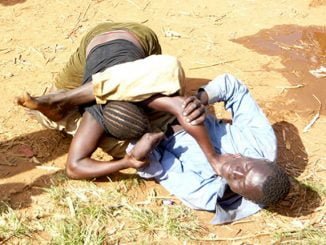
Arua, Uganda | By Michael Wandati | A recent survey conducted by Makerere University School of Public Health has revealed that 40% of female commercial sex workers in Arua district and Arua City are married.
This study, which included 640 participants across the two regions, found that 31% of these women are cohabiting, while 9% are legally married.
Bernard Amaga, the Arua City Health Educator and HIV Focal Person, expressed concern over these statistics, highlighting that 30% of the respondents tested positive for HIV. He noted that although the survey was conducted in 2022, the findings were only released this week, providing a concerning snapshot of the current situation despite the delay.
Amaga mentioned that another study is currently underway, with results anticipated next year. These will help guide local authorities in addressing the ongoing issues.
He emphasized that the presence of married women in commercial sex work points to underlying socio-economic challenges that must be addressed.
To combat these issues, city authorities are collaborating with development partners like the Infections Disease Institute (IDI) and the Most at Risk Population Initiative (MAPI). Their efforts include outreach programs aimed at testing sex workers for HIV, with those who test positive being provided with antiretroviral therapy (ARVs) and those negative receiving pre-exposure prophylaxis.
Amaga also committed to strengthening networks of people living with HIV, which are essential for social mobilization, advocacy, and community support.
Judith Bako, the Deputy Resident City Commissioner in Arua City, pointed out that high HIV prevalence in border districts is exacerbated by the influx of non-nationals. She urged local leaders to allocate part of their revenue towards combating HIV.
Dona Aseru Abiniku, chairperson of the National Community of Women Living with HIV and Aids in Uganda (NACWOLA), explained that economic pressures are driving some married women into sex work to supplement their income. She highlighted the financial burdens men face in supporting their families, which often leaves little for their wives.
Abiniku added that societal pressures to keep up with trends compel some women to seek alternative means of income. She advised couples to engage in counseling at various stages of their lives to navigate challenges together, noting that the misconception that money is the sole source of happiness can lead to risky choices.
“As long as you think all that you need to live happy is around money you are going to use all methods, all ways to survive, which may not be comfortable or appreciated by the community,” Abiniku said.
Also Read: Why Mbarara struggles with surge in HIV/AIDS infections
Luke Candia, a resident of Arua City living with HIV, has urged local authorities to relax the eligibility criteria for government poverty-alleviation initiatives like the Parish Development Model (PDM) and the Women Entrepreneurship Program.
He believes that making these programs more accessible to vulnerable groups, including those living with HIV, will help them launch income-generating activities and enhance their livelihoods.
Currently, the HIV prevalence rate in Arua City is reported at 4.4%. Candia’s appeal highlights the urgent need for supportive measures that enable affected individuals to improve their economic situations and promote community resilience.



